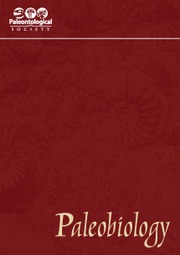Crossref Citations
This article has been cited by the following publications. This list is generated based on data provided by
Crossref.
COCKELL, CHARLES S.
and
KNOWLAND, JOHN
1999.
Ultraviolet radiation screening compounds.
Biological Reviews,
Vol. 74,
Issue. 3,
p.
311.
Cockell, Charles S.
2000.
The ultraviolet history of the terrestrial planets — implications for biological evolution.
Planetary and Space Science,
Vol. 48,
Issue. 2-3,
p.
203.
Cockell, Charles S.
and
Blaustein, Andrew R.
2000.
“Ultraviolet spring” and the ecological consequences of catastrophic impacts.
Ecology Letters,
Vol. 3,
Issue. 2,
p.
77.
Day, Thomas A.
2001.
Ecosystems, Evolution, and Ultraviolet Radiation.
p.
80.
Cockell, Charles S.
2001.
Ecosystems, Evolution, and Ultraviolet Radiation.
p.
1.
Wignall, P.B.
2001.
Large igneous provinces and mass extinctions.
Earth-Science Reviews,
Vol. 53,
Issue. 1-2,
p.
1.
Benítez, Narciso
Maíz-Apellániz, Jesús
and
Canelles, Matilde
2002.
Evidence for Nearby Supernova Explosions.
Physical Review Letters,
Vol. 88,
Issue. 8,
Visscher, Henk
Looy, Cindy V.
Collinson, Margaret E.
Brinkhuis, Henk
van Konijnenburg-van Cittert, Johanna H. A.
Kürschner, Wolfram M.
and
Sephton, Mark A.
2004.
Environmental mutagenesis during the end-Permian ecological crisis.
Proceedings of the National Academy of Sciences,
Vol. 101,
Issue. 35,
p.
12952.
Hallock, Pamela
2005.
Global change and modern coral reefs: New opportunities to understand shallow-water carbonate depositional processes.
Sedimentary Geology,
Vol. 175,
Issue. 1-4,
p.
19.
Thomas, Brian C.
Jackman, Charles H.
Melott, Adrian L.
Laird, Claude M.
Stolarski, Richard S.
Gehrels, Neil
Cannizzo, John K.
and
Hogan, Daniel P.
2005.
Terrestrial Ozone Depletion due to a Milky Way Gamma-Ray Burst.
The Astrophysical Journal,
Vol. 622,
Issue. 2,
p.
L153.
Melott, Adrian L.
Thomas, Brian C.
Hogan, Daniel P.
Ejzak, Larissa M.
and
Jackman, Charles H.
2005.
Climatic and biogeochemical effects of a galactic gamma ray burst.
Geophysical Research Letters,
Vol. 32,
Issue. 14,
Vogt, Joachim
Sinnhuber, Miriam
and
Kallenrode, May-Britt
2009.
Geomagnetic Field Variations.
p.
159.
Linder, Greg
Palmer, Brent
Little, Edward
Rowe, Christopher
and
Henry, Paula
2010.
Ecotoxicology of Amphibians and Reptiles, Second Edition.
p.
105.
Melott, Adrian L.
and
Thomas, Brian C.
2011.
Astrophysical Ionizing Radiation and Earth: A Brief Review and Census of Intermittent Intense Sources.
Astrobiology,
Vol. 11,
Issue. 4,
p.
343.
Willis, K. J.
Feurdean, A.
Birks, H. J. B.
Bjune, A. E.
Breman, E.
Broekman, R.
Grytnes, J-A.
New, M.
Singarayer, J. S.
and
Rozema, J.
2011.
Quantification of UV-B flux through time using UV-B-absorbing compounds contained in fossil Pinus sporopollenin.
New Phytologist,
Vol. 192,
Issue. 2,
p.
553.
Iacono-Marziano, Giada
Marecal, Virginie
Pirre, Michel
Gaillard, Fabrice
Arteta, Joaquim
Scaillet, Bruno
and
Arndt, Nicholas T.
2012.
Gas emissions due to magma–sediment interactions during flood magmatism at the Siberian Traps: Gas dispersion and environmental consequences.
Earth and Planetary Science Letters,
Vol. 357-358,
Issue. ,
p.
308.
Fulton, James M.
Arthur, Michael A.
and
Freeman, Katherine H.
2012.
Subboreal aridity and scytonemin in the Holocene Black Sea.
Organic Geochemistry,
Vol. 49,
Issue. ,
p.
47.
Zhang, Yan
Ren, Zhong‐Yuan
and
Xu, Yi‐Gang
2013.
Sulfur in olivine‐hosted melt inclusions from the Emeishan picrites: Implications for S degassing and its impact on environment.
Journal of Geophysical Research: Solid Earth,
Vol. 118,
Issue. 8,
p.
4063.
Ludwig, Peter
Bishop, Shawn
Egli, Ramon
Chernenko, Valentyna
Deneva, Boyana
Faestermann, Thomas
Famulok, Nicolai
Fimiani, Leticia
Gómez-Guzmán, José Manuel
Hain, Karin
Korschinek, Gunther
Hanzlik, Marianne
Merchel, Silke
and
Rugel, Georg
2016.
Time-resolved 2-million-year-old supernova activity discovered in Earth’s microfossil record.
Proceedings of the National Academy of Sciences,
Vol. 113,
Issue. 33,
p.
9232.
Meert, Joseph G.
Levashova, Natalia M.
Bazhenov, Mikhail L.
and
Landing, Ed
2016.
Rapid changes of magnetic Field polarity in the late Ediacaran: Linking the Cambrian evolutionary radiation and increased UV-B radiation.
Gondwana Research,
Vol. 34,
Issue. ,
p.
149.

